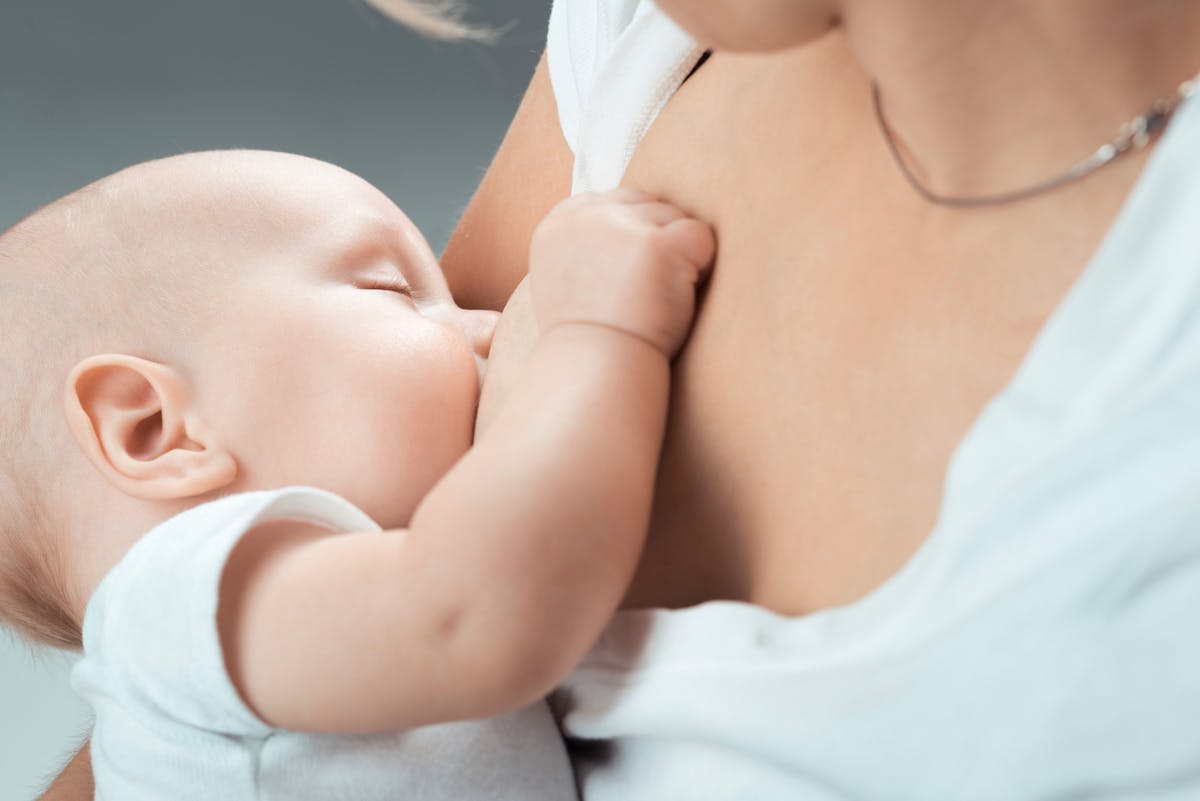Eating low carb or keto when breastfeeding

Strict low carb and breastfeeding
Most people can eat as few carbs as they want because they’ll quickly go into nutritional ketosis, a normal and healthy metabolic state in which the body uses fat and ketones as its main energy source.
But when breastfeeding, extremely low carb intake can possibly lead to a dangerous condition called ketoacidosis, in rare cases. For reasons that aren’t entirely understood, it seems to be related to the metabolic changes and increased nutritional demands of producing milk.3
To our knowledge, there have been fewer than 10 published cases of ketoacidosis specifically connected to breastfeeding on a low carb diet.4 So the risk is likely quite low, and apparently each case ended happily.
But it’s also possible that they could have ended in tragedy:
Ketoacidosis while breastfeeding can be triggered by other things besides following a low carb diet. For example, it can happen if you fast or have a hard time eating during illness or after surgery, no matter what type of diet you follow.5
It’s simply important to get enough nutrients while breastfeeding. Severe reduction by any means can place the mother at risk.
How to eat low carb if breastfeeding
If you’re breastfeeding you should not do a strict low carb diet. You likely need to add more carbs, at least 50 grams per day, to be safe.6
Remember that it’s also important to eat adequate calories in general, and the metabolic demands of breastfeeding will likely require more than your usual amount of calories.7
One way to make sure you get enough carbs is to add three fruits per day or extra servings of root veggies, to an otherwise strict low carb or keto menu. But you can choose whichever way you prefer to get the extra carbs, like selecting moderate and liberal low carb recipes (using the advanced recipe search).
More
Is low carb safe during pregnancy?
Can low carb help with gestational diabetes in pregnancy?
More
Eating low carb or keto when breastfeeding - the evidence
This guide is written by Dr. Andreas Eenfeldt, MD and was last updated on July 28, 2022. It was medically reviewed by Dr. Bret Scher, MD on April 21, 2020.
The guide contains scientific references. You can find these in the notes throughout the text, and click the links to read the peer-reviewed scientific papers. When appropriate we include a grading of the strength of the evidence, with a link to our policy on this. Our evidence-based guides are updated at least once per year to reflect and reference the latest science on the topic.
All our evidence-based health guides are written or reviewed by medical doctors who are experts on the topic. To stay unbiased we show no ads, sell no physical products, and take no money from the industry. We're fully funded by the people, via an optional membership. Most information at Diet Doctor is free forever.
Read more about our policies and work with evidence-based guides, nutritional controversies, our editorial team, and our medical review board.
Should you find any inaccuracy in this guide, please email andreas@dietdoctor.com.
High-quality research has consistently found that carb restriction is safe and effective for weight loss:
The British Journal of Nutrition 2016: Effects of low carbohydrate diets v. low-fat diets on body weight and cardiovascular risk factors: a meta-analysis of randomized controlled trials [strong evidence]
PloS One 2015: Dietary intervention for overweight and obese adults: comparison of low carbohydrate and low-fat diets. A meta-analysis [strong evidence] ↩
There are no studies defining where a “safe” level of carb intake is for breastfeeding mothers. However, the potentially dangerous case reports presented in this guide consistently occurred with severe carb restriction. Therefore, it seems reasonable that moderate or liberal carb restriction (above 50 grams per day) should be adequate to minimize risk. As always, mothers need to pay attention to how they are feeling and add more carbs and contact their physician if they are feeling unwell. ↩
Although ketoacidosis is fairly common in lactating dairy cows, it has also been seen in breastfeeding women on rare occasions:
The Journal of Emergency Medicine 2008: A case of lactation “bovine” ketoacidosis[case report; very weak evidence] ↩
Sultan Qaboos University Medical Journal 2019: Lactation ketoacidosis: A case series[case series; very weak evidence]
Case Reports in Nephrology 2019: Ketogenic diet-induced severe ketoacidosis in a lactating woman: a case report and review of the literature[case report; very weak evidence]
The American Journal of Emergency Medicine 2019: Breastfeeding ketoacidosis: A rare but important diagnosis for emergency physicians to recognize[case report; very weak evidence]
Endocrinology, Diabetes & Metabolism Case Reports 2017: A rare cause of metabolic acidosis: ketoacidosis in a non-diabetic lactating woman[case report; very weak evidence]
Läkartidningen 2015: Severe ketoacidosis in breastfeeding woman with low energy and carbohydrate intake[case report; very weak evidence]
Nephrology, Dialysis, Transplantation Plus 2009: A case of bovine ketoacidosis in a lactating woman[case report; very weak evidence]
↩Here are a few examples of cases in which breastfeed women developing ketoacidosis while fasting or eating very little due to surgery or illness:
Nutrition Journal 2015: Ketoacidosis in a non-diabetic woman who was fasting during lactation[case report; very weak evidence]
La Revue de Médecine Interne 2015: Starvation ketosis in a breastfeeding woman[case report; very weak evidence]
The Permanente Journal 2016: Lactation ketoacidosis: an unusual entity and a review of the literature[case report; very weak evidence] ↩
Medical Clinics of North America 2016: Nutrition recommendations in pregnancy and lactation. [overview article; ungraded] ↩